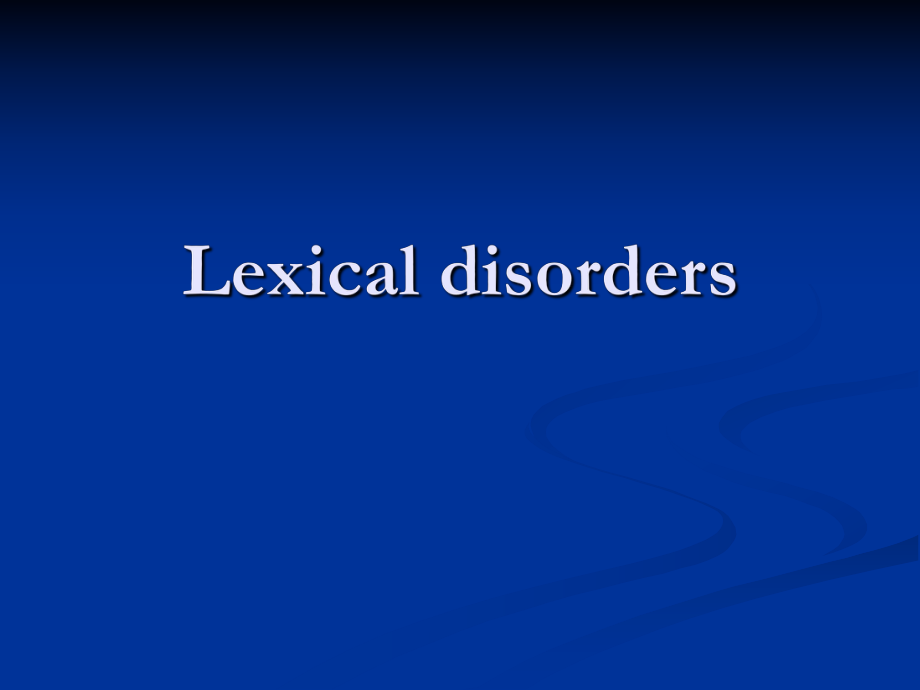 Lexical disorders
Lexical disorders



《Lexical disorders》由会员分享,可在线阅读,更多相关《Lexical disorders(72页珍藏版)》请在装配图网上搜索。
1、nAphasia is a disorder of language and speech that is caused by a brain lesion which may be due to an accident or a stroke.nIn aphasic patients, there is typically some residual language left after brain damage, indicating that the knowledge of language can be selectively impaired by brain lesions,
2、and it is by carefully studying the range and nature of such selective impairments that we hope to learn something about the interconnections of the brain mechanisms underlying language.Specific Language Impairment (SLI)nSLI is a term covering disorders in the normal acquisition of language without
3、there being any clear primary deficit. nSLI children and adults have normal non-verbal IQs, no hearing deficits and no obvious emotional or behavioural disturbances.nSLI provides an important strand in the argument for the strong innateness views Chomsky proposed. If our knowledge of language and, s
4、pecifically, of grammar, is indeed controlled by our genes, then we should expect to find genetically caused disorders of grammatical development, i.e. something has gone wrong with the language genes. Words and morphemes in aphasianstandard clinical classification of aphasic syndromesntwo character
5、istic types of errors of word usagenin aphasia : (1)agrammatism and affects function words such as articles, auxiliaries, complementisers and bound morphemes, such as those marking tense and agreement in English, and also gender, case, etc. in those languages such as Italian and Russian; (2) parapha
6、sias, which are errors in the use of content words that typically occur in Wernickes aphasics; function words seem to be unaffected in these cases.Two attempts by aphasic patients to describe a picture of a child stealing a biscuitn(1) Ah little boy cookies, pass a little boy Tip, up fall (from a Br
7、ocas aphasic): telegraphic speechn(2) They have the cases, the cookies, and they were helping each other with the good (by a Wernickes aphasic): inappropriate content-word selectionParaphasiasntarget picture: SHARK nsubjects responses: na. fishnb. troutnc. guitarnd. rainbow troutThree levels of cate
8、gorization in taxonomiesnthe basic level: (trout, shark and guitar);nthe superordinate level: ( fish, musical instrument, fruit);nthe subordinate level: (rainbow trout, great white shark, bass guitar)nEither Superordinate level term (fish) or a prototypical element from the basic set (trout)nSLI sub
9、jects were asked to match a picture of an object from a set of multiple-choice pictures to a test word presented orally by the experimenter. nTest word: chair; Subjects choices: a picture of na. CHAIR b. STAIR c. TABLE d. APPLEnI. Frequency effects:nLow-frequency content words yield more paraphasias
10、 than high-frequency words.nII. Categorisation-level effects:na. Hyponym exchanges: sparrow owlnb. Use of superordinates: sparrow birdnIII. Similarity effects:na. Semantic exchanges: hair combnb. Pragmatic exchanges: flowers visit (flowers and visits are often associated in everyday life)SLI subject
11、s inflectional systemsna ten-year-old SLI child:na. you got a tape recordersnb. the four bus go in Bouchervillenc. when the cup break he get repairnd. the Marie-Louise look at the birdne. the superman is say good-bye and hidingnf. the ambulance arrivenSLI subjects knowledge of inflection is selectiv
12、ely impaired.nThe selective impairment enables us to conclude that two psychological capacities (the ability to implement rules and the ability to retrieve forms from memory) can be dissociated.(2)Different grammatical functions ofthe affixes is the controlling factornSLI childrens usage of the thir
13、d person singular present -s was only 36 per cent correct, whereas 83 per cent of their -s plurals were correct.nSLI subjects performance with the plural is considerably better than with the tense/agreement suffix.nnominative accusative genitivenI me my/minenwe us our/oursnyou you your/yoursnhe him hisnshe her her/hersnit it itsnthey them their/theirsnwho who(m) whosenMary Mary Marysnthe dog the dog the dogs
- 温馨提示:
1: 本站所有资源如无特殊说明,都需要本地电脑安装OFFICE2007和PDF阅读器。图纸软件为CAD,CAXA,PROE,UG,SolidWorks等.压缩文件请下载最新的WinRAR软件解压。
2: 本站的文档不包含任何第三方提供的附件图纸等,如果需要附件,请联系上传者。文件的所有权益归上传用户所有。
3.本站RAR压缩包中若带图纸,网页内容里面会有图纸预览,若没有图纸预览就没有图纸。
4. 未经权益所有人同意不得将文件中的内容挪作商业或盈利用途。
5. 装配图网仅提供信息存储空间,仅对用户上传内容的表现方式做保护处理,对用户上传分享的文档内容本身不做任何修改或编辑,并不能对任何下载内容负责。
6. 下载文件中如有侵权或不适当内容,请与我们联系,我们立即纠正。
7. 本站不保证下载资源的准确性、安全性和完整性, 同时也不承担用户因使用这些下载资源对自己和他人造成任何形式的伤害或损失。
